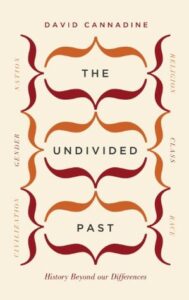 The Undivided Past, David Cannadine
The Undivided Past, David Cannadine
I’m not sure if I’ve totally grasped the point of this book, because if I have, it seems very simplistic: basically, that none of the great dividers between people (religion, nationality, class, gender, etc) are actually as divisive as we think, and that they haven’t been historically either — that men and women have cooperated in societies before now, that Islam and Christianity have coexisted, etc, etc. If there’s really a trend for historians to claim that’s not so, then it does make sense to offer a counterpoint, but it’s not really a point of view I’ve ever seen. While people might not have been talking about intersectionality under that name for so long, I think it’s always been obvious that it exists.
So, in that sense, Cannadine’s book reads as though he’s setting up a series of strawmen to knock down. Of course religion doesn’t divide us wholly — nor does it unite us, as he shows by talking about the quarrels between Catholics and Protestants, or Sunni and Shiite Muslims. Of course there’s been cooperation between genders, between nations, and of course there has been conflict between them. To me, a lot of this seemed very obvious, and hardly worth spending so much ink and paper discussing why it proves that no one identity divides (or unites) man.
If the call is ultimately for unity, one still has to wonder — on the basis of what? Humanity? But the time is coming, if it hasn’t already come, where we could dispute the boundaries of humanity. If you rely on machines to survive, are you human? Are your interests aligned with “humanity”? Once almost any organ can be replaced with an artificial one, is a person in receipt of a lot of those surgeries still human, with the same preoccupations and needs as the rest of us? (My answer would be yes, but it’s a thing which has yet to be debated politically and socially, outside of science fiction.)
Also, I think it’s already showing its age, and it was published in 2013. There’s been no movements based on male identity, according to Cannadine — but Men’s Rights and GamerGate have been a thing. And there’s no modern feminism? What about EverydaySexism, etc?
The book is still a worthwhile survey of the divisions between us and how significant (and not) they’ve been, but if I understood the thesis correctly, then it’s not exactly groundbreaking.

Leave a Reply